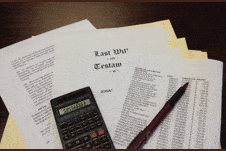Are Wills Public Record? How Do I Find a Will in New York City?

Whether wills are public record in NY is a complicated question. But basically, they are not.
Wills are Usually Not Filed or Recorded Anywhere While a Person is Living
When a person makes a will in NY, it’s usually not filed with the court while they are living. A will is kept by the person who made it, or by the attorney who helped them. The will-maker keeps it in their house, or the attorney keeps it in a safe in their office. There is no database or central depository for wills of people who are living.
Once someone dies, their will has to be filed with the court. It does not mean that it always happens. It is possible that a will is lost, the person who made the will changed their mind and destroyed it, or someone else destroyed it. Or it got destroyed in a flood for example. All kinds of things happen. Because a will does not have to be filed or registered anywhere until the will-maker dies, not all wills make it to court.
If a will is last seen in possession of the person who made it and is not found after their death, then the law presumes that the person who made the will changed their mind and destroyed the will.
How to Find a Record of a Will After a Person Dies
After a person dies, if you believe that they had a will and you are an interested party in connection with that will, such as when you are a beneficiary of the will or you are a relative of the person who left the will, you can go to the court of the county where the will is filed and request to look at the will. So in that way, wills in NY are more of a private record, accessible to the people who are entitled to see it.
You will likely have to go to the court record room in person. There is no database or a public access system to see wills filed in NY.
There are several ways to find out the probate status of a decedent’s will in New York. If someone filed the will with the Surrogate’s Court, then it is a matter of record (not public record). By going down to the court clerk’s office and paying a fee, you can request and obtain a copy of the probate file of the decedent.
If you don’t live in the area, you can call the court clerk, and if they will not provide the information, you can hire a New York attorney to go to the Court to retrieve the file. The court clerk is able to provide limited information over the telephone, such as the case number or hearing dates. They may or may not provide that information.
If you know who has information about the will, you can contact that person. Or you can contact their attorney. But the rule of thumb is, if that person does not wish to speak to you, their attorney will not speak to you either.
You can contact the attorney for the estate or the executor or personal representative to get more information.
What Happens if there is No Will to be Found
If no one has filed the will with the Court, then it may be possible that the person who died did not have a will at all. Or the person destroyed their will, thereby invalidating it. The heirs and beneficiaries would have to ask the Court to appoint an administrator or personal representative to administer the estate. Property of the decedent would then pass to the beneficiaries or heirs according to New York intestate succession laws.
It would also be possible for the beneficiaries to agree to a different distribution than the legal default. Estates of people dying without a will are also of public records, and you can obtain a copy of a no-will file from the Surrogate’s Court.
If the person who died had assets that were not required to pass through probate, then it may not be necessary for there to be a probate proceeding – their assets would pass to the beneficiaries and heirs outside of the probate. Assets that pass outside of probate are not public record. Assets that pass outside of probate are typically assets that are held in joint ownership or have a designated beneficiary. Examples include real estate, bank, stock and other financial accounts, title to motor vehicles or other vessels, life insurance policies, 401(k) and different types of retirement accounts. Property that a decedent transfers to a trust is passed to the beneficiaries of the decedent at the decedent’s death outside of probate as well and is not of public record either.
When to Look for an Attorney
You should consult a New York probate and estate attorney regarding New York probate matters. If you are looking to find out if wills are public record in NY, it is likely you may need an attorney.
It is important to choose an attorney who is knowledgeable about the New York probate process and can help you determine the New York probate status of a will as well as assist you with other probate matters.
On the topic of will being in public records or looking for a will, consultations are paid only. Thank you for understanding.
